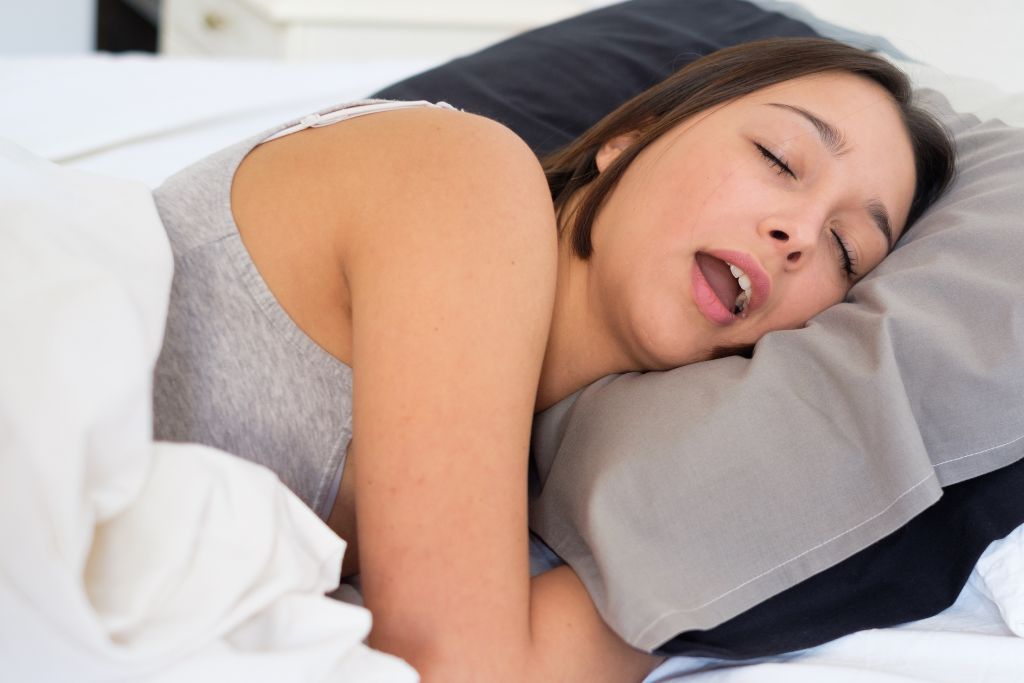If You Snore Loudly and Frequently, It May Be a Sign of a Serious Oral Health Problem
You or a partner may be aware that you snore, which is very common. According to the Sleep Foundation, 57% of American men and 40% of women (as well as 27% of children) snore.
Up to 70% of snorers are believe to suffer from sleep apnea and 80-90% of these cases are due to obstructive sleep apnea or OSA (central sleep apnea or CSA is a brain disorder which has to be treated with a medicine).
OSA is usually due to some type of obstruction of the airway, such as excess tissue around the throat or a large tongue, when sleeping on his or her back (the most comfortable position for many, especially if overweight). This blocks the ability to breathe with the mouth and many have trouble breathing through the nose (because of allergies or a deviated septum, for example.) This results in a brief shortage of oxygen, a pause for 10 seconds of more known as an apnea, which can happen up to 100 times a night.
Why is this so important? The brain reacts by trying to wake up the individual to breathe deeply, but this happens before he or she becomes fully conscious, so sleep resumes afterwards with no awareness of the disruption. In the morning, however, everyone who suffers from sleep apnea is extremely tired. That has serious consequences because even just driving to work becomes dangerous. Sleep deprivation from all causes results in around 100,000 vehicle accidents a year in the U.S. and 1,500 deaths.
What other symptoms of OSA should cause concern?
- Even if someone does get to the office safely, he or she is likely to fall asleep while working, even in meetings (and will still be at risk to drive home).
- Severe sleep deprivation for any reason makes it hard to focus and remember things.
- Sleep apnea significantly raises the risk for high blood pressure, atrial fibrillation, stroke, and erectile dysfunction.
- Headaches, especially migraines, are common.
- Because partially awakening causes sleepers to be more aware of the need to urinate, they tend to get up far more often to do so, disrupting sound sleep even further.
- Breathing through the mouth causes individuals to awaken with a sore throat and dry mouth (saliva normally counteracts oral bacteria that can cause periodontal or gum disease). Many wake up feeling they have cotton in their mouth due to this, as well.
- Those with even moderate sleep apnea have blood oxygen levels only 50-80% of normal; in a hospital, a patient whose oxygen dropped to 92% would be given an oxygen mask.
- Those who suffer from sleep apnea are likely to be overweight and have a large neck size, so these are significant signs of high risk.
How Wilshire Smile Studio Can Help Alleviate Sleep Apnea
So how can Wilshire Smile Studio help address sleep apnea? According to Robert L. Talley in “Dental Sleep Medicine” (a chapter in Craniofacial Pain: A Handbook for Assessment, Diagnosis and Management), an oral appliance worn at night and which we can create will hold the tongue forward so it does not block the airway.
The trouble can also be due to the dislocation of the hinges connecting the upper and lower jaws, in which case an orthotic splint (usually made to prevent grinding of teeth) can be created with our dental laboratory, which can be worn to gradually push the bite to its proper position. We can also teach you neuromuscular relaxation exercises to help return the jaws to their normal functioning.
Sometimes dental work, such as putting dental crowns over teeth that have been worn down, can improve the bite and thus breathing during sleep. In cases of excess tissue, our oral surgeon can remove it.
These approaches are endorsed by the American Academy of Dental Sleep Medicine as alternatives that may be a better option than the traditional medical remedy, the Continuous Positive Airway Pressure (CPAP) system that requires someone to wear a mask connected to an oxygen machine while lying on the back. Talley says an estimate is that 25-50% find this so uncomfortable that they abandon this therapy completely.
If you believed you or a loved one may suffer from sleep apnea, call us at (323) 765-0292 today to set an appointment for a full dental exam and a discussion of the symptoms. It is never too soon to prevent a decline in your oral and overall health.

